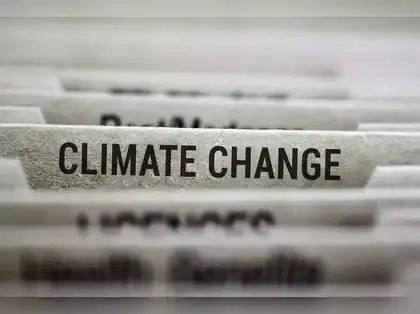As politicians gather in Belem, Bill Gates has provided an insight: climate summits like COP30 should prioritise what truly improves human lives and not just chase reductions in emissions or temperatures. His point is overdue and common sense.
Policymakers should always ask: what's the smartest way to do the most good with limited resources? For billions, tackling immediate challenges like poverty and disease outweighs chasing distant temperature goals. Every year, more than 7.5 mn people in poorer countries die from illnesses that can be very cheaply prevented or managed. Smart investments in health, nutrition and education could save over 4 mn people each year while also building growth and resilience for the future.
Gates's common-sense message is at the crest of a growing global shift in thinking. For years, making drastic emissions cuts at any cost was the paramount policy goal. Anyone questioning the supremacy of climate threat or expressing scepticism at the costly policies was derided as a 'climate denier'.
Pragmatism and nuanced thinking are back in fashion. In the US, Democrat senator Chris Coons declared that climate is 'not a top three issue right now'. Canada's Liberal PM Mark Carney-who warned a decade ago that potential climate catastrophe meant fossil fuel reserves could be 'unburnable'-is fast-tracking the construction of an LNG export terminal and promising to 'transform our country into an energy superpower'. Even green-leaning British and German governments are now talking about the need to inject some economics into climate and energy policy.
Climate change is a real problem. But it's not the end of the world. Unaddressed, it may shave 2-3% off global GDP by 2100. So, we'll be 435% richer instead of 450%. Some arguments need to be busted:
Climate spending is not crowding out efforts to tackle poverty Anyone living in the real world knows that money can't be spent twice. Multilateral development banks-international organisations funded largely by taxpayers to help the world's poorest countries-devoted an $137 bn to climate financing in 2024. That is money that won't be spent on preventing disease and hunger.
Globally, we have spent over $14 tn on climate policies. Last year alone, the cost exceeded $2 tn. Again, it's money spent on climate policy that cannot be spent on basic education and maternal healthcare.
There's no greater threat to developing nations than the climate crisis This claim is patronising. It suggests that climate campaigners in ivory towers know far better than those from 'developing countries'. In real life, Africans from 39 nations rank climate as their 31st most important problem of 34-far behind education, jobs, health and roads.
A climate summit focused on human welfare would recognise that boosting prosperity is one of the best policy responses to climate change, as it makes people more resilient. In the Amazon city of Belem, the world's private jets of climate elites have landed. There-perhaps more than anywhere else-it's well past time for common sense to get a hearing.
Policymakers should always ask: what's the smartest way to do the most good with limited resources? For billions, tackling immediate challenges like poverty and disease outweighs chasing distant temperature goals. Every year, more than 7.5 mn people in poorer countries die from illnesses that can be very cheaply prevented or managed. Smart investments in health, nutrition and education could save over 4 mn people each year while also building growth and resilience for the future.
Gates's common-sense message is at the crest of a growing global shift in thinking. For years, making drastic emissions cuts at any cost was the paramount policy goal. Anyone questioning the supremacy of climate threat or expressing scepticism at the costly policies was derided as a 'climate denier'.
Pragmatism and nuanced thinking are back in fashion. In the US, Democrat senator Chris Coons declared that climate is 'not a top three issue right now'. Canada's Liberal PM Mark Carney-who warned a decade ago that potential climate catastrophe meant fossil fuel reserves could be 'unburnable'-is fast-tracking the construction of an LNG export terminal and promising to 'transform our country into an energy superpower'. Even green-leaning British and German governments are now talking about the need to inject some economics into climate and energy policy.
Climate change is a real problem. But it's not the end of the world. Unaddressed, it may shave 2-3% off global GDP by 2100. So, we'll be 435% richer instead of 450%. Some arguments need to be busted:
Climate spending is not crowding out efforts to tackle poverty Anyone living in the real world knows that money can't be spent twice. Multilateral development banks-international organisations funded largely by taxpayers to help the world's poorest countries-devoted an $137 bn to climate financing in 2024. That is money that won't be spent on preventing disease and hunger.
Globally, we have spent over $14 tn on climate policies. Last year alone, the cost exceeded $2 tn. Again, it's money spent on climate policy that cannot be spent on basic education and maternal healthcare.
There's no greater threat to developing nations than the climate crisis This claim is patronising. It suggests that climate campaigners in ivory towers know far better than those from 'developing countries'. In real life, Africans from 39 nations rank climate as their 31st most important problem of 34-far behind education, jobs, health and roads.
A climate summit focused on human welfare would recognise that boosting prosperity is one of the best policy responses to climate change, as it makes people more resilient. In the Amazon city of Belem, the world's private jets of climate elites have landed. There-perhaps more than anywhere else-it's well past time for common sense to get a hearing.
(Disclaimer: The opinions expressed in this column are that of the writer. The facts and opinions expressed here do not reflect the views of www.economictimes.com.)






Bjørn Lomborg
President, Copenhagen Consensus, and author of False Alarm: How Climate Change Panic Costs Us Trillions, Hurts the Poor, and Fails to Fix the Planet